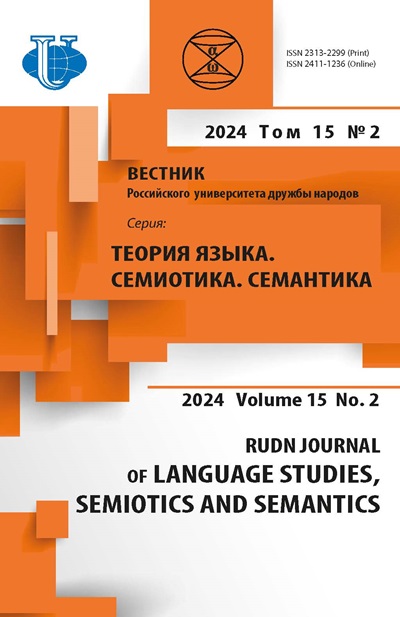Perceptive Lexemes attention, perception, memory in Terminological Use
- Authors: Romanova T.V.1, Kolchina O.N.1
-
Affiliations:
- National Research University Higher School of Economics
- Issue: Vol 15, No 2 (2024)
- Pages: 329-347
- Section: COGNITIVE RESEARCH. PAREMIOLOGY
- URL: https://journals.rudn.ru/semiotics-semantics/article/view/39844
- DOI: https://doi.org/10.22363/2313-2299-2024-15-2-329-347
- EDN: https://elibrary.ru/QISOQA
Cite item
Full Text
Abstract
The term system of cognitive science is interdisciplinary in nature and is formed from different areas of scientific discourse. The terminological meaning is also developed in commonly used lexemes. The words attention, perception, memory, knowledge, consciousness, impact, when they call cognitive abilities, functions, mental processes, human behavioral reactions, become terms. The purpose of this article is to analyze the process of terminology of commonly used lexemes with a perceptual meaning, which include the lexemes attention, perception and the lexeme memory associated with the result of perceptual activity by causation relations (component ‘see’→’remember’). The material for the study was the definitions of these lexemes in explanatory dictionaries, dictionaries of synonyms, antonyms, phraseological dictionaries, linguoculturological, word-formation dictionaries. This made it possible to determine the features of their national word usage and a set of semes that could become the basis for the emerging terminological meaning. The second stage of the study included the analysis of the use of these words as terms in works on cognitive linguistics (publications in the periodicals “Issues of Cognitive Linguistics”, “Cognitive Studies of Language”, “Bulletin of Moscow State University, Series 19: Linguistics and Intercultural Communication, section Cognitive Studies ). Based on the materials of publications, a corpus was created, including 752 texts, 8,062,613 word usages. The discovered collocats showed intrasystemic connections of lexemes attention, perception, memory. An associative experiment was also conducted, in which 1-4 year students enrolled in the program Fundamental and Applied Linguistics of the National Research University Higher School of Economics. The results of the experiment confirmed the assumption about the influence of commonly used semantic components of the meanings of Russian words on the formation of a new terminological meaning in such lexemes. The data obtained were summarized in the form of prototype articles of the Project Dictionary of Cognitive Terms
Keywords
About the authors
Tatiana V. Romanova
National Research University Higher School of Economics
Author for correspondence.
Email: tvromanova@mail.ru
ORCID iD: 0000-0002-1833-2711
SPIN-code: 6424-1929
Dr.Sc. in Philology (Advanced Doctorate), Professor, Head of the Department of Fundamental and Applied Linguistics, Faculty of Humanities
30, Sormovskoe highway, Nizhny Novgorod, Russian Federation, 603014Olga N. Kolchina
National Research University Higher School of Economics
Email: on-kolchina@yandex.ru
ORCID iD: 0000-0001-5206-5103
SPIN-code: 3638-1427
ResearcherId: AAC-2133-2022
PhD in Philology, Associate Professor at the Department of Fundamental and Applied Linguistics, Faculty of Humanities
30, Sormovskoe highway, Nizhny Novgorod, Russian Federation, 603014References
- Shcherbatykh, Yu.V. (2008). General psychology. Moscow: Piter. (In Russ.).
- Kuligina, E.D. Attention as a cognitive function. URL: https://kpfu.ru/portal/docs/F631736573/Kuligina.pdf. (accessed: 14.05.2022). (In Russ.).
- Nurkova, V.V. & Berezanskaya, N.B. (2016). General psychology. Moscow: Jurajt. (In Russ.).
- Meshcheryakov, B.G. & Zinchenko, V.P. (2003). Big psychological dictionary. Moscow: Prajm-Evroznak. (In Russ.).
- Ryabykh, E.B. & Zakharova, M.A. (2020). Reflection of the processes of thinking and verbalization in the metaphorical picture of the world. Cognitive Language Studies, 42, 79–85. (In Russ.).
- Laenko, L.V. (2006). Perception-consciousness-language: the problem of interconnection. Vestnik NSU Series Linguistics and Intercultural Communication, 1, 5–15. (In Russ.).
- Vendina, T.V. (1998). Russian language picture of the world through the prism of word formation (microcosm). Moscow: Indrik. (In Russ.).
- Denisova, N.V. (2021). Conceptual art as a way to consolidate collective memory. Cognitive Language Studies, 3, 335–339. (In Russ.).
- Batyushkina, M.V. (2021). Legal and linguistic uncertainty of terms and norms of Russian laws. Russian Language Studies, 19(2), 138–154. (In Russ.).
- Bednárová-Gibová, K. (2019). Synonymic Traps in Selected English Lexical Semantics Terms. RUDN Journal of Language Studies, Semiotics and Semantics, 10(4), 754–760. https://doi.org/10.22363/2313-2299-2019-10-4-754-760 (In Russ.).
- Bozhenkova, N.A., Rubleva, E.V. & Baharloo, H. (2023). Dictionary of IT terms as a tool for Russian language studies and linguodidactics in the context of digitalization in education. Russian Language Studies, 21(4), 457–473. https://doi.org/10.22363/2618-8163-2023-21-4-457-473
- Grinev-Griniewicz, S.V. & Sorokina, E.A. & Molchanova, M.M. (2022) Reconsidering the Definition of the Term. RUDN of Language Studies, Semiotics and Semantics, 13(3), 710–729. https://doi.org/10.22363/2313-2299-2022-13-3-710-729 (In Russ.).
- Komarova, V., Koroļova, S. & Ruža, O. (2023). Methodology and Technique for Assessing the Terminology Consistency in Translations: Based on Latvian and Russian Economic Texts. RUDN Journal of Language Studies, Semiotics and Semantics, 14(1), 9–35. https://doi.org/10.22363/2313-2299-2023-14-1-9-35
- Osokina, E.A. (2018). The author’s comparative lexicography: problem statement, opportunities and prospects. RUDN Journal of Language Studies, Semiotics and Semantics, 9(2), 416–438. https://doi.org/10.22363/2313-2299-2018-9-2-416-438 (In Russ.).
- Romanova, T.V. & Kolchina, O.N. (2022). Russian Cognitive Terms as a Result of Integration Processes in Scientific Discourse. RUDN Journal of Language Studies, Semiotics and Semantics, 13(4), 972–988. https://doi.org/10.22363/2313-2299-2022-13-4-972-988 (In Russ.).
- Shkapenko, T.M. & Vaulina, S.S. (2023). Semantic Transformations of the Lexeme Икона in the Russian Language of the Newest Period. RUDN Journal of Language Studies, Semiotics and Semantics, 14(4), 1139–1153. https://doi.org/10.22363/2313-2299-2023-14-4-1139-1153
- Antipova, A.S., Rabeson, M.D. & Smirnova, O.V. (2021). Semantic shift in conflict terminology in contemporary Russian socio-cultural media discourse. Training, Language and Culture, 5(2), 73–89. https://doi.org/10.22363/2521-442X-2021-5-2-73-89
- Grishechko, E.G. (2023). Language and cognition behind simile construction: A Pythonpowered corpus research. Training, Language and Culture, 7(2), 80–92. https://doi.org/10.22363/2521-442X-2023-7-2-80-92
- Langlois, J. (2020). Language and cognitive science: How language affects reasoning and memory. Training, Language and Culture, 4(3), 66–76. https://doi.org/10.22363/2521-442X-2020-4-3-66-76
- Radyuk, A.V. (2022). Accounting terminology in English economic discourse (based on India’s The Company Act 2013). Training, Language and Culture, 6(4), 9–19. https://doi.org/10.22363/2521-442X-2022-6-4-9-19













